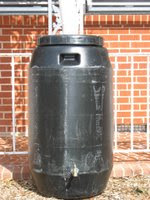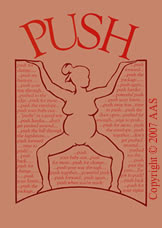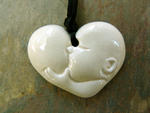Prenatal and birth memories are a little more complicated than what we think of as memory. Prenates and newborns are very sensory. Their brain is recording every event from conception forward. Language develops over time as the human infant and toddler put words to feelings and make connections. A good example came up today at my house. My 14 year old was talking about "remembering" seeing her father and I in bed and how she didn't know what it was about. Now she does. That is how children learn everything --- just because they don't have words for the experience as an infant or toddler doesn't mean they don't remember it. By the time she KNOWs the language to understand and speak about sex, she has known about it for a very long time.
It is well- known and accepted that the brain wires in response to experience. Research and technology of the 90's confirmed and deepened our understanding of the brain. This development of the human brain begins in the womb, begins at conception and during the first weeks of life the neural tube is one of the earliest structures. The experience of the newborn and infant is as real as yours or mine is now. The baby is experiencing something -- and the brain responds and wires connections ... safe or scary, happy or angry, fearful or relaxed ... their sensory oriented body takes it in and it is recorded in the brain. This is why we talk to and touch the baby, and it is why we give them visual stimulus. It is known if this interaction with the environment is minimal or violent or distracted the baby won't develop intellectually or appropriately.
According to Gerald Vind, a neurobiologist and expert in prenatal brain imprinting and reimprinting"
Norepinephrine acts in the developing nervous system of a prenate to suppress the growth of irrelevant and undesirable neural connections, while at the same time facilitating the formation of relevant synaptic connections. Norepinephrine also provides protection in the brain, especially a part of the emotional center (limbic system) that is called the amygdala. It prevents damage to the amygdala and suppresses abnormal kindling activity (seizure activity) when operating under conditions of peak activity. Under conditions of acute or repetitive maternal stress, norepinephrine levels are depleted. This is typically accompanied by the secretion of natural opiates that also exert an inhibitory effect on the release of norepinephrine. During pregnancy these natural opiates are passed through the placenta and influence the development of the prenate. At any stage of a developing brain, the depletion of norepinephrine, along with excessive amygdala activation, and opiate release, can lead to permanent structural and functional alterations affecting brain interconnections, synaptic size and densities, as well as their responsiveness. With repeated instances of heightened stress activities, an abnormal form of neuronal interconnections can develop along with a reduced response threshold. In other words, severe maternal stress while you are carried inside your mother’s womb can really mess up the way your brain is "wired." This is how the foundational capacity for empathy and socialization is handicapped.
And people get so "jiggy" about babies remembering birth and early infancy --- babies who are fully formed human beings from second trimester on, awake and looking around at birth, and their brains don't remember? Basic brain development is that the human baby experiences and interacts with the environment and the brain responds and "wires" up in response. Was it happy or sad, joyful or painful, stressful or gentle?
Once one understands that consciousness is present in the cellular matter of the egg and the sperm one begins to see how everything happening outside the womb of the baby is contributing to his or her development. Some say it's inappropriate to speak to children about their birth?? On some level that is so laughable, because of the utter ridiculousness that the baby doesn't remember -- as if the baby wasn't there and didn't experience the birth. HIS or HER birth.
There is a field of scientific research looking at the primal period of life and specifically the last trimester when the human fetus has been shown to be interacting, tasting, feeling, sensing, and hearing and responding to the environment. There is also a field called Infant Psychology and most major universities have a research lab looking at the ability of the human newborn's effort to interact with his or her new environment. Yet, we are expected to believe that this development from primal period to infancy is somehow in the "off" position during labor and birth? So, that a baby is not impacted by the experience?
We have evidence about prenatal period so it is inappropriate to dismiss the birth experience. THEN, one can begin to look at conception and the first imprint of perception, based on the mother's hormones in response to HER experience -- love, ambivalence, guilt, rape. Emotions result in hormones. How the cells join together to create the one cell of the new human in a particular hormonal environment is the first experience of the human being. It's so logical that in every cell that develops from that cell, the being knows what happened at conception. This continues through gestation, labor and birth. How can we logically and morally and scientifically say that process and experience of birth is insignificant to the baby?
Anti-homebirth folks rail against women for thinking only of their own experience. They are chastised for putting their baby in great harm and putting their need for a good experience ahead of the baby's. Most birth caregivers refuse to consider the baby's experience.
What would it hurt to consider how the birth might be experienced by the baby and that same science about development applies to the period of labor and birth as it does to the prenatal and post-birth period?
The Other Side of the Glass
Part One was officially released June 2013 in digital distribution format.
To purchase to to www.theothersideoftheglass.com
If you were a donor and want to download your copy send an email to theothersideoftheglassfilm@gmail.com.
The trailer
Subscribe to:
Post Comments (Atom)
"Soft is the heart of a child. Do not harden it."
A public awareness reminder that things that happen behind the scenes, out of our sight, aren't always as rosy as we might think them to be. Perhaps its a restaurant cook who accidentally drops your burger
on the floor before placing it on the bun and serving it to you. Here it's an overworked apathetic (pathetic) nurse giving my newborn daughter her first bath.
Please comment and rate this video, so as to insure that it is viewed as widely as possible, perhaps to prevent other such abuse. -- The mother who posted this YouTube. How NOT to wash a baby on YouTube
Are you going to try to tell me that "babies don't remember?" There is no difference to this baby's experience and the imprinting of her nervous system/brain and one that is held and cleaned by the mother or father either at the hospital or at home?
By the way, this is probably NOT the baby's first bath. The nurse is ungloved. Medical staff protocol is that they can't handle a baby ungloved until is has been bathed (scrubbed if you've seen it) because the baby is a BIO-HAZARD -- for them. Never mind that the bio-hazard IS the baby's first line of defense against hospital germs.
Missouri Senator Louden Speaks
Finally, A Birth Film for Fathers
Part One of the "The Other Side of the Glass: Finally, A Birth Film for and about Men" was released June, 2013.
Through presentation of the current research and stories of fathers, the routine use of interventions are questioned. How we protect and support the physiological need of the human newborn attachment sequence is the foundation for creating safe birth wherever birth happens.
Based on knowing that babies are sentient beings and the experience of birth is remembered in the body, mind, and soul, fathers are asked to research for themselves what is best for their partner and baby and to prepare to protect their baby.
The film is designed for midwives, doulas, and couples, particularly fathers to work with their caregivers. Doctors and nurses in the medical environment are asked to "be kind" to the laboring, birthing baby, and newborn. They are called to be accountable for doing what science has been so clear about for decades. The mother-baby relationship is core for life. Doctors and nurses and hospital caregivers and administrators are asked to create protocols that protect the mother-baby relationship.
Men are asked to join together to address the vagaries of the medical system that harm their partner, baby and self in the process of the most defining moments of their lives. Men are asked to begin to challenge the system BEFORE they even conceive babies as there is no way to be assured of being able to protect his loved ones once they are in the medical machine, the war zone, on the conveyor belt -- some of the ways that men describe their journey into fatherhood in the medicine culture.
Donors can email theothersideoftheglassfilm@gmail.com to get a digital copy.
Through presentation of the current research and stories of fathers, the routine use of interventions are questioned. How we protect and support the physiological need of the human newborn attachment sequence is the foundation for creating safe birth wherever birth happens.
Based on knowing that babies are sentient beings and the experience of birth is remembered in the body, mind, and soul, fathers are asked to research for themselves what is best for their partner and baby and to prepare to protect their baby.
The film is designed for midwives, doulas, and couples, particularly fathers to work with their caregivers. Doctors and nurses in the medical environment are asked to "be kind" to the laboring, birthing baby, and newborn. They are called to be accountable for doing what science has been so clear about for decades. The mother-baby relationship is core for life. Doctors and nurses and hospital caregivers and administrators are asked to create protocols that protect the mother-baby relationship.
Men are asked to join together to address the vagaries of the medical system that harm their partner, baby and self in the process of the most defining moments of their lives. Men are asked to begin to challenge the system BEFORE they even conceive babies as there is no way to be assured of being able to protect his loved ones once they are in the medical machine, the war zone, on the conveyor belt -- some of the ways that men describe their journey into fatherhood in the medicine culture.
Donors can email theothersideoftheglassfilm@gmail.com to get a digital copy.
Buy the film at www.theothersideoftheglass.com.
The film focuses on the male baby, his journey from the womb to the world and reveals healing and integrating the mother, father, and baby's wounded birth experience. The film is about the restoring of our families, society, and world through birthing loved, protected, and nurtured males (and females, of course). It's about empowering males to support the females to birth humanity safely, lovingly, and consciously.
Finally, a birth film for fathers.
The film focuses on the male baby, his journey from the womb to the world and reveals healing and integrating the mother, father, and baby's wounded birth experience. The film is about the restoring of our families, society, and world through birthing loved, protected, and nurtured males (and females, of course). It's about empowering males to support the females to birth humanity safely, lovingly, and consciously.
Finally, a birth film for fathers.
What People Are Saying About the FIlm
Well, I finally had a chance to check out the trailer and .. wow! It's nice that they're acknowledging the father has more than just cursory rights (of course mom's rights are rarely acknowledged either) and it's great that they're bringing out the impact of the experience on the newborn, but I'm really impressed that they're not shying away from the political side.
They are rightly calling what happens in every American maternity unit, every day, by its rightful name - abuse. Abuse of the newborn, abuse of the parents and their rights, abuse of the supposedly sacrosanct ethical principal of patient autonomy and the medico-legal doctrine of informed consent, which has been long ago discarded in all but name. I love it!
In the immortal words of the "shrub", "bring it on!" This film needs to be shown and if I can help facilitate or promote it, let me know.
Father in Asheville, NC
Thanks for sharing this. It was very touching to me. I thought of my brother-in-law standing on the other side of the glass when my sister had to have a C-section with her first child because the doctor was missing his golf date. I'll never forget his pacing back and forth and my realizing that he was already a father, even though he hadn't been allowed to be with his son yet.
Margaret, Columbia, MO
They are rightly calling what happens in every American maternity unit, every day, by its rightful name - abuse. Abuse of the newborn, abuse of the parents and their rights, abuse of the supposedly sacrosanct ethical principal of patient autonomy and the medico-legal doctrine of informed consent, which has been long ago discarded in all but name. I love it!
In the immortal words of the "shrub", "bring it on!" This film needs to be shown and if I can help facilitate or promote it, let me know.
Father in Asheville, NC
OMG'ess, I just saw the trailer and am in tears. This is so needed. I watch over and over and over as fathers get swallowed in the fear of hospitals birth practice. I need a tool like this to help fathers see how very vital it is for them to protect their partner and baby. I am torn apart every time I see a father stand back and chew his knuckle while his wife is essentially assaulted or his baby is left to lie there screaming.
Please send me more info!!!!
Carrie Hankins
CD(DONA), CCCE, Aspiring Midwife
720-936-3609
Thanks for sharing this. It was very touching to me. I thought of my brother-in-law standing on the other side of the glass when my sister had to have a C-section with her first child because the doctor was missing his golf date. I'll never forget his pacing back and forth and my realizing that he was already a father, even though he hadn't been allowed to be with his son yet.
Margaret, Columbia, MO
In case you don't find me here
Soon, I'll be back to heavy-duty editing and it will be quiet here again. I keep thinking this blog is winding down, and then it revives. It is so important to me.
I wish I'd kept a blog of my journey with this film this past 10 months. It's been amazing.
I have a new blog address for the film, and will keep a journal of simple reporting of the journey for the rest of the film.
www.theothersideoftheglassthefilm.blogspot.com
I'll be heading east this week to meet with a group of men. I plan to post pictures and clips on the film blog.
I'll keep up here when I can -- when I learn something juicy, outrageous, or inspiring related to making birth safer for the birthing baby.
I wish I'd kept a blog of my journey with this film this past 10 months. It's been amazing.
I have a new blog address for the film, and will keep a journal of simple reporting of the journey for the rest of the film.
www.theothersideoftheglassthefilm.blogspot.com
I'll be heading east this week to meet with a group of men. I plan to post pictures and clips on the film blog.
I'll keep up here when I can -- when I learn something juicy, outrageous, or inspiring related to making birth safer for the birthing baby.
Review of the film
Most of us were born surrounded by people who had no clue about how aware and feeling we were. This trailer triggers a lot of emotions for people if they have not considered the baby's needs and were not considered as a baby. Most of us born in the US were not. The final film will include detailed and profound information about the science-based, cutting-edge therapies for healing birth trauma.
The full film will have the interviews of a wider spectrum of professionals and fathers, and will include a third birth, at home, where the caregivers do a necessary intervention, suctioning, while being conscious of the baby.
The final version will feature OBs, RNs, CNMs, LM, CPM, Doulas, childbirth educators, pre and perinatal psychologists and trauma healing therapists, physiologists, neurologists, speech therapists and lots and lots of fathers -- will hopefully be done in early 2009.
The final version will include the science needed to advocated for delayed cord clamping, and the science that shows when a baby needs to be suctioned and addresses other interventions. Experts in conscious parenting will teach how to be present with a sentient newborn in a conscious, gentle way -- especially when administering life-saving techniques.
The goal is to keep the baby in the mother's arms so that the baby gets all of his or her placental blood and to avoid unnecessary, violating, and abusive touch and interactions. When we do that, whether at home or hospital, with doctor or midwife, the birth is safe for the father. The "trick" for birthing men and women is how to make it happen in the hospital.
The full film will have the interviews of a wider spectrum of professionals and fathers, and will include a third birth, at home, where the caregivers do a necessary intervention, suctioning, while being conscious of the baby.
The final version will feature OBs, RNs, CNMs, LM, CPM, Doulas, childbirth educators, pre and perinatal psychologists and trauma healing therapists, physiologists, neurologists, speech therapists and lots and lots of fathers -- will hopefully be done in early 2009.
The final version will include the science needed to advocated for delayed cord clamping, and the science that shows when a baby needs to be suctioned and addresses other interventions. Experts in conscious parenting will teach how to be present with a sentient newborn in a conscious, gentle way -- especially when administering life-saving techniques.
The goal is to keep the baby in the mother's arms so that the baby gets all of his or her placental blood and to avoid unnecessary, violating, and abusive touch and interactions. When we do that, whether at home or hospital, with doctor or midwife, the birth is safe for the father. The "trick" for birthing men and women is how to make it happen in the hospital.






No comments:
Post a Comment